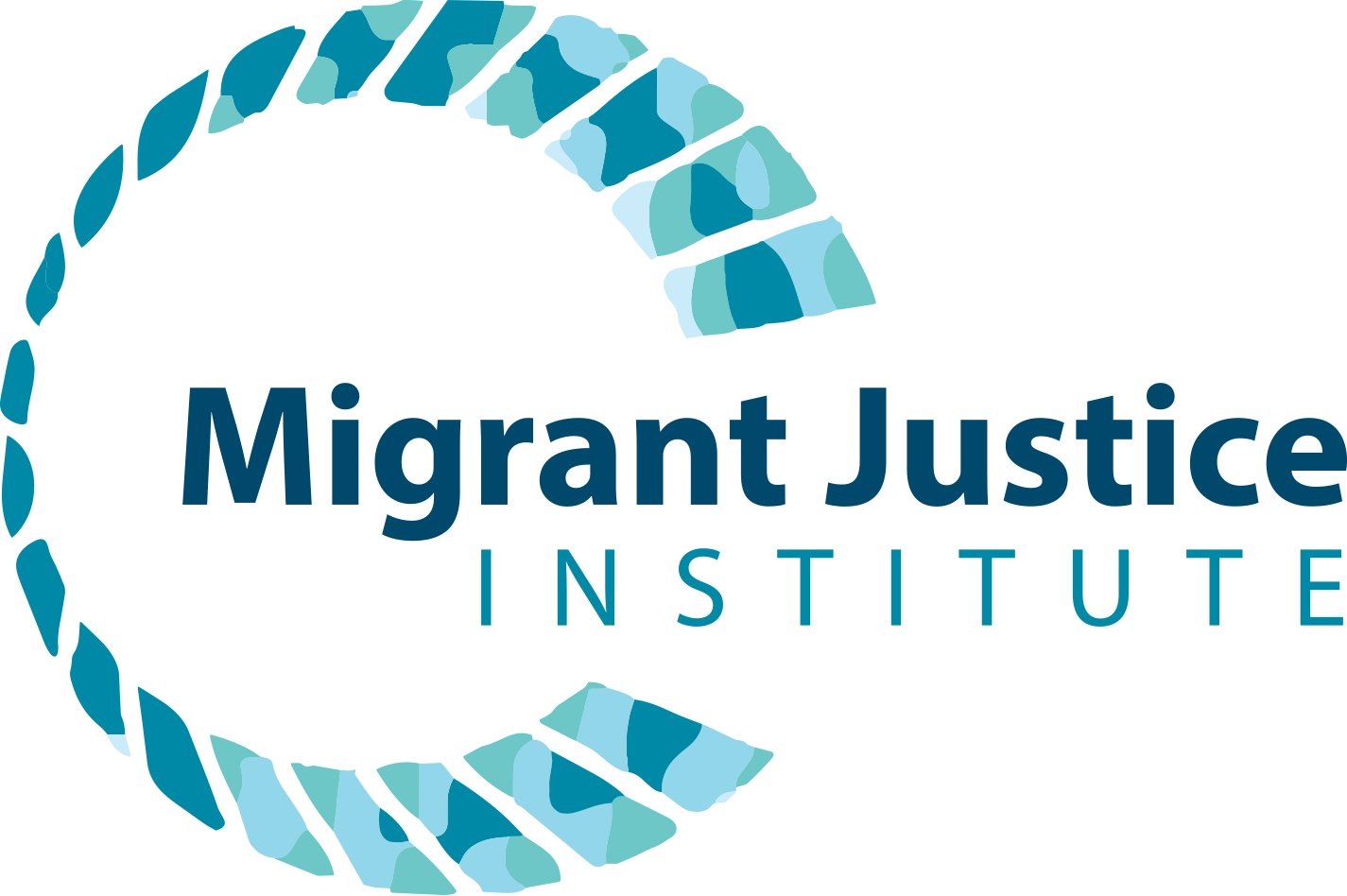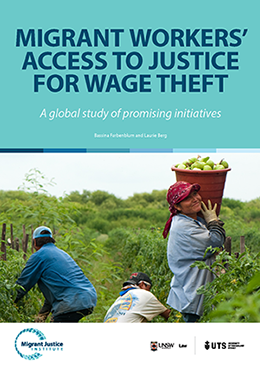Systemic wage theft has long been part of the labour migration landscape in every region of the world. During COVID-19, egregious underpayment of migrant workers was even more widespread as businesses encountered financial pressures and vast numbers of workers were repatriated without payment of their wages. Though every jurisdiction has judicial and/or administrative mechanisms to address wage claims, employers in every country can be confident that very few unpaid migrant workers will ever use those mechanisms to recover their wages. This is because the system is stacked against them at every stage in the wage claim process.
In 2021, Migrant Justice Institute launched a global multi-year program of work to improve migrant workers’ access to justice for wage theft, in partnership with Solidarity Center, The ILAW Network and MIDEQ, with generous support from Open Society Foundations.
RESEARCH AND POLICY BRIEF | Avenues for exploited migrant workers to remain in their country of employment to pursue labour remedies
Exploited migrant workers often don't raise complaints because they fear losing their visa or being deported. There is generally no opportunity for migrant workers to pursue wage claims at the end of their stay because they must immediately leave the country.
As a result, abusive employers are never held to account, and the vast majority return home without the wages they are owed. Pursuing claims after they leave is extremely difficult.
Governments must create migration frameworks that reduce the vulnerability of migrant workers who address exploitation, and enable exploited migrants to extend their stay for a short period in the country of employment to remedy wage theft and hold employers accountable for labour violations.
Our new Research and Policy Brief sets out best practice models that governments should consider implementing, with discussion of current global examples of promising laws and policies intended to achieve these goals.
This includes current examples of
visa portability for exploited migrant workers to bring claims and find a new sponsor,
short term visas with work rights to pursue wage claims at the end of a migrant worker’s stay,
deferral of removal (with work rights) for undocumented workers who pursue labour claims, and
visas for victims of trafficking and criminal wage theft and exploitation to pursue civil labour claims.
The Brief is accompanied by a more detailed case study of recent advances in the United States.
These include new policies that enable migrant workers, including undocumented workers, to remain in the country for up to two years with work rights in order to pursue unpaid wages and other labour claims, certified by local, state and federal labour agencies and other enforcement bodies.
Wage theft from migrant workers and barriers to justice are poorly understood. We have produced a short Explainer document and accompanying video based on extensive empirical research in different global regions. The Explainers provide governments, business and advocates with accessible answers to key questions:
What is wage theft and what forms can it take?
Why do employers systemically underpay migrant workers?
How is wage theft related to forced labour and modern slavery?
Why don’t migrant workers report wage theft and bring claims against employers? What barriers are created by migration laws, and why don’t labour claim systems work for migrant workers?
How can governments and business reduce risks and make wage claims work?
We hope the Explainers can inform and support global, national and local campaigns for reform.
Please share widely.
In 2021, Migrant Justice Institute collaborated with the Solidarity Center and ILAW Network to identify initiatives from around the world that seek to disrupt employer expectations of impunity and enable migrant workers to bring claims and obtain redress for wage theft.
We published these in a report that enables advocates to identify specific, practical reform targets that can form the basis of collaborative and evidence-based wage theft campaigns on a global, national and local scale.
COMMENTARY | Ending impunity for Wage Theft against Migrant Workers: here’s how
Our commentary on a path forward for migrant workers’ access to justice for wage theft, hosted by our friends at Institute for Human Rights and Business.
Webinars
A global discussion on innovations in migration settings to enable migrant workers to address exploitation without risking immigration status.
To access a separate version with interpreting, click on the relevant link below on a computer desktop:
العربية (Arabic)
Español (Spanish)
Français (French)
Pусский (Russian)
Enter passcode 4ziM.#Ky and click world icon.
-
• Shannon Lederer, AFL-CIO | Deferral of removal for undocumented workers in the U.S.
• Richard Prosser & Simon Barrett, New Zealand Ministry of Business Innovation & Employment | New Zealand Migrant Exploitation Protection Work Visa
• Lilana Keith, Platform for Undocumented Migrants (PICUM) | Finland Residence Permit Due to Exploitation
• Adrian Pereira, North South Initiative | Lessons from Special Pass in Malaysia
• Assoc. Prof. Laurie Berg, Migrant Justice Institute & UTS Law | Proposed Workplace Justice Visa in Australia
• Moderator: Neha Misra, Solidarity Center
Introduction by Assoc. Prof. Bassina Farbenblum, Migrant Justice Institute & UNSW Law and closing remarks by Prof. Heaven Crawley, United Nations University Center for Policy Research & MIDEQ
A global discussion on the ways in which unions are successfully supporting migrant workers to achieve labour justice.
-
• Philipp Schwertmann, Arbeit und Leben| DGB/VHS (Germany)
• Kıvanç Eliaçık | DISK (Turkey)
• Edwin Atema | FNV (Netherlands)
• Vivienne Wiles | CFMMEU (Australia)
• Shiella Estrada | Pinay Careworkers Transnational (Hong Kong)
• Bassina Farbenblum | Migrant Justice Institute (Australia/global)
• Irem Arf, ITUC | Moderator
A global conversation on the ways advocates are addressing the challenges that migrant workers face in recovering the wages owed to them, and promising developments and strategies for systemic change.
-
• Sophia Kagan | International Labour Organization
• Ruwan Subasinghe | International Transport Workers' Federation
• Vani Saraswathi | Migrant-Rights.org
• Evy Peña | Centro de los Derechos del Migrante
With remarks by Bassina Farbenblum (Migrant Justice Institute) and Monika Mehta (The Solidarity Center)
An important discussion with lawyers, advocates and organisers about innovative strategies they have used to drive effective reforms.
-
• Neha Misra and Jeffrey Vogt, Solidarity Center | Moderators
• Ruth Silver-Taube | Santa Clara University School of Law
• Angélica Palacios Martínez | Solidarity Center, Colombia
• Rachel Micah-Jones |Centro de los Derechos del Migrante (CDM)
• Amanda Aziz | Migrant Workers Centre Canada
• Associate Prof Bassina Farbenblum and Associate Prof Laurie Berg | Migrant Justice Institute
Report authors and other global experts discuss what’s working, why, and which reform targets will have the greatest impact on making government wage remediation systems work in every region.
-
Elizabeth Frantz, Open Society Foundations | Moderator
Associate Profs Bassina Farbenblum & Associate Profs Laurie Berg, Migrant Justice Institute | The study’s key findings and most impactful reforms
Shawna Bader-Blau, The Solidarity Center | The global campaign for migrant worker justice for wage theft: where to from here?
Ben Harkins, International Labour Organisation | Opportunities for international organisations to improve wage recovery processes: lessons from Migrant Resource Centres in South East Asia
Terri Gerstein, Harvard University and Economic Policy Institute (former NY Dept of Labor) | State and local enforcement innovations in the US
Douglas MacLean, Justice Without Borders | Pursuing wage claims across borders: innovations and lessons from Southeast Asia
Apolinar Tolentino, BWI | Building collective worker power to recover wages across borders
Jill Wells, Engineers Against Poverty | Holding business to account: supply chain liability for remedying wage theft in the construction industry






